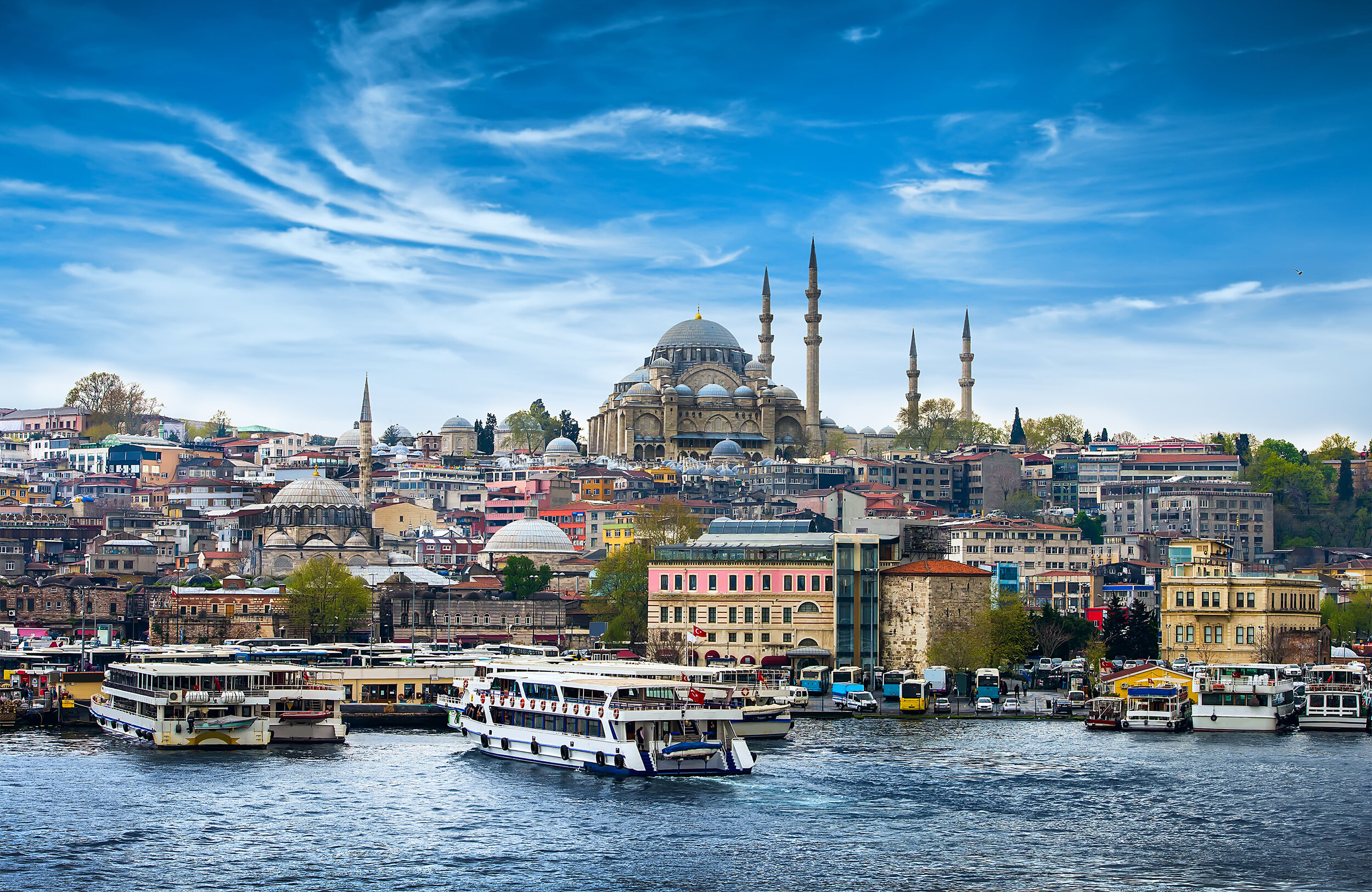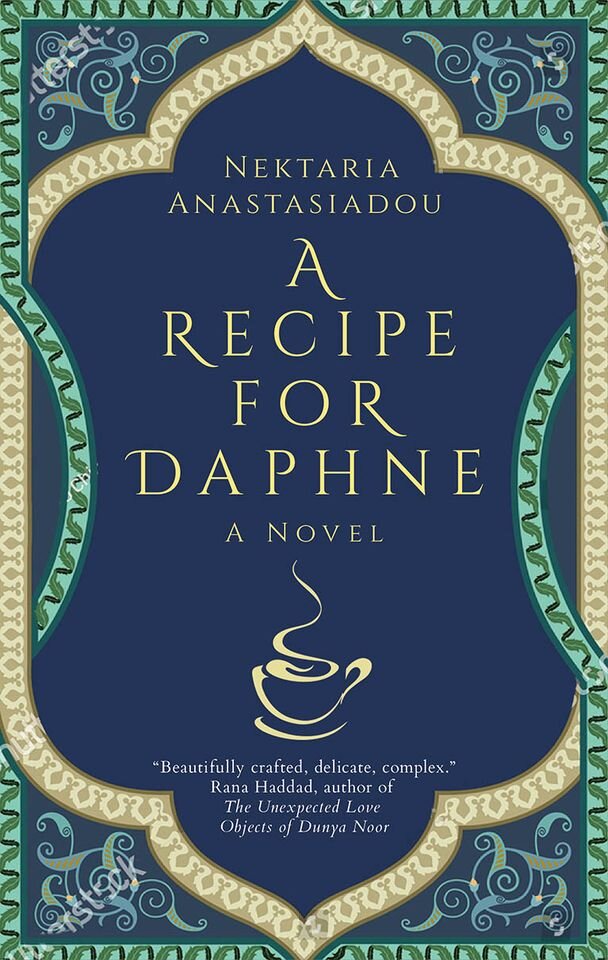
A Recipe for Daphne, a novel by Nektaria Anastasiadou
Hoopoe/American University of Cairo (2020)
ISBN 9789774169793
Anne-Marie O’Connor
From its skyline of mosques, churches and ruins on the Bosphorus, to its intoxicating mix of Islamic and European art, the majestic city of Istanbul can feel like an elaborate seduction. Its present is filigreed over layers of history, with a modern Muslim majority revealing persistent glimmers of its ancient Byzantine Christian past.
Daphne, an American-born traveler, receives an unexpected welcome amidst Istanbul’s proud community of Rum, Greek Orthodox Christians, who have lived in Istanbul for centuries. Order a copy.
Nektaria Anastasiadou sets her novel A Recipe for Daphne in what remains of this Christian world.
She eases into her story with food, bringing readers to Istanbul bakeries where pastries filled with pistachio cream beckon irresistibly from the counter; avenues where rose, cardamom, and chocolate are sold with mahleb and mastic; lively tea houses where Istanbul’s legendary street cats are pampered alongside patrons.
Istanbul’s culinary culture suffuses the initiation of Daphne, a young American woman who is exploring her roots in Istanbul’s Rum community, whose name derives from their historic roots in Rome’s Eastern Byzantine Empire.
Daphne is modern and deracinated, a Miami diaspora emissary to a shrinking Istanbul minority whose elders dream of past glory and cling to the traditions they have managed to preserve.
She has a much less complicated relationship than her Turkish relatives with Istanbul and its feast of the senses. You can almost hear the Anatolian music wafting in the air as Kosmas, a young baker who hopes to catch her eye, brings a near-erotic sensuality to his instructions for using just the right amount of butter to coax the flaky separations from a delicate pastry that must be consumed the day it is made.
What kind of cake would Kosmas bake for Daphne?
Kosmas closes his eyes and summons a ravishing arsenal—spices from the Egyptian Bazaar, butter-cream icing, decoration styled like embroidery—that would seem to confirm any suspicions that Istanbul is a sensualist’s dream.
“The motifs will be Ottoman: foliage, tulips, carnations, hyacinths. From top to bottom, in an elegant curve, will stretch one stem of white orchids,” Kosmas promises, as he privately imagines putting his lips to Daphne’s hand and kissing her all the way up her arm.
Whether Daphne will succumb to the temptation to fully taste all this, with a boyfriend lurking back home, is the question.
The Rum world of yesterday is seen through the eyes of Fanis, a widower who, at first glance, is the kind of aging Lothario that used to be viewed as a lovable rogue. Fanis appraises women with a compulsively roving eye, going over memories of his romantic encounters like a celebrant counting rosary beads.
His reflexive male gaze barely keeps at bay a trauma that lives in his heart, and in the soul of his vanishing Rum community, who are haunted by a 1955 pogrom against Istanbul Christians that left more than a dozen dead and many more raped and brutalized. The pogrom upended his betrothal, and sent Istanbul Christians abroad. Tens of thousands more Rum were deported in later years, until a community of more than 100,000 shrank to a few thousand.

Fanis struggles to exorcise his demons. How did their neighbors turn against them?
Daphne is unfettered by this troubling past. She explores the myriad attractions of her Istanbul heritage with the lighter eye of a woman with agency. She takes a detached view of expectations of gender and religion, viewing them as suggestions, not rules, as she weighs embracing her patrimony on her own terms, as a lifestyle, rather than a holiday fling.
The pages of Anastasiadou’s novel shimmer with the romance of Istanbul, and her vivid prose evokes its magical melange, even as her characters wonder how to hold on to their vibrant but dwindling world.
They share a sense of uncertainty with Armenian Christians, whose collective memory holds the trauma of the Turkish army killing of hundreds of thousands of Armenian civilians during the genocide of World War I.
The weight of this history is counter-balanced by the strong tug of ancient roots: Believers say disciples of Christ were first called Christians in what is now the Turkish city of Antioch. Their identity runs deep.
In the searching conversations that give this novel a pulse, its characters unspool the twists of Turkish history that brought light or darkness, pondering aloud over what this portends for their future.
It is a dialogue that is very much alive among Istanbul minorities today. Not long ago I met a Turkish Jewish man in Istanbul married to a Muslim woman. The identification their adult children choose “depends on the day of the week,” he said, smiling, with the pride some Turks have for the multiculturalism that endures. But his children live in London, and his Orthodox Jewish elders have moved to Israel.
A Recipe for Daphne suggests this rich East-meets-West ethnic stew can still be stirred by its peoples.



